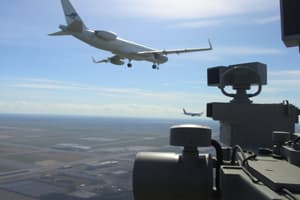Podcast
Questions and Answers
What was the Sussex Pledge?
What was the Sussex Pledge?
- A plan to create the League of Nations
- A promise made by Germany not to sink non-military ships (correct)
- A treaty signed after WWI
- A campaign strategy by the Allies
When was the Versailles Treaty signed?
When was the Versailles Treaty signed?
June 28, 1919
Who were the Allies in WWI?
Who were the Allies in WWI?
- Germany, Austria-Hungary
- Ottoman Empire
- France, British Empire, Russian Empire (correct)
- Italy, Japan
What was President Woodrow Wilson's Peace Plan called?
What was President Woodrow Wilson's Peace Plan called?
How much were Germany forced to pay in reparations?
How much were Germany forced to pay in reparations?
What organization was created by the Treaty of Versailles?
What organization was created by the Treaty of Versailles?
What does mobilization refer to?
What does mobilization refer to?
What is genocide?
What is genocide?
What is sedition?
What is sedition?
What is an armistice?
What is an armistice?
Who were the Central Powers?
Who were the Central Powers?
What event sparked the start of WWI?
What event sparked the start of WWI?
Describe the sinking of the Lusitania.
Describe the sinking of the Lusitania.
What was unrestricted submarine warfare?
What was unrestricted submarine warfare?
What does 'U-Boat' stand for?
What does 'U-Boat' stand for?
What was the Convoy System?
What was the Convoy System?
Flashcards are hidden until you start studying
Study Notes
Sussex Pledge
- Issued on May 4, 1916, in response to U.S. protests against German unrestricted submarine warfare.
- Germany promised not to sink passenger ships and to warn non-military vessels before engaging.
- The pledge was violated on February 1, 1917, when Germany resumed attacking American ships.
Versailles Treaty
- Signed on June 28, 1919, at the Palace of Versailles in France, concluding WWI.
- Harsh terms imposed on Germany included disarmament, loss of territory (Alsace-Lorraine to France), and $33 billion in reparations.
- Established the League of Nations to promote international cooperation.
Allies
- Also known as the Entente Powers, opposing the Central Powers during WWI.
- Original members included France, the British Empire, and the Russian Empire.
14 Point Peace Plan
- Proposed by President Woodrow Wilson, aimed at a fair and lasting peace post-WWI.
- Key proposals included: no secret treaties, freedom of the seas, free trade, arms reduction, and the establishment of the League of Nations.
- Rejected by allies who felt it was too lenient towards Germany.
Reparations
- Financial compensation imposed on Central Powers during the Paris Peace Conference.
- Germany was required to pay $33 billion in reparations to the Allies.
League of Nations
- An international organization created after WWI as part of the Treaty of Versailles.
- Proposed by Woodrow Wilson; however, the U.S. ultimately chose not to join.
Mobilization
- Refers to preparing for war by gathering supplies, personnel, and organizing resources for military deployment.
Genocide
- Defined as the deliberate extermination of a large group of people, typically targeting specific ethnicities or nationalities.
Sedition
- Any communication or action that promotes insurrection against established authority.
Armistice
- A formal agreement between warring parties to cease hostilities temporarily.
Central Powers
- Comprised Germany, Austria-Hungary, Bulgaria, and the Ottoman Empire during WWI.
Spark that Started the War
- The assassination of Archduke Franz Ferdinand of Austria-Hungary by a member of the Black Hand, a Serbian nationalist group, triggered the conflict, following Austria's ban on Serbia's livestock exports.
Stalemate
- A situation where neither combatant can secure a decisive victory or advance.
Sinking of the Lusitania
- On May 7, 1915, a German U-boat sunk the British passenger ship, resulting in the deaths of 1,198 people, including 128 Americans, heightening tensions leading to U.S. involvement.
Unrestricted Submarine Warfare
- Naval warfare tactic employed by Germany, targeting both military and civilian vessels without warning.
- The method prompted the Sussex Pledge as a diplomatic response to American concerns.
U-Boat
- An abbreviation for "Unterseeboot," referring to German submarines which revolutionized naval warfare.
Convoy System
- Implemented in May 1917, merchant and troop ships traveled in groups, protected by armed naval vessels, to minimize losses from U-boat attacks during WWI.
Studying That Suits You
Use AI to generate personalized quizzes and flashcards to suit your learning preferences.


